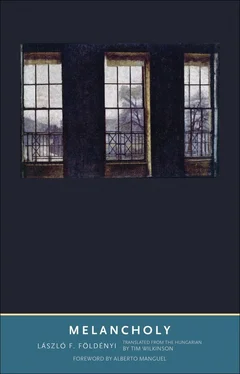Numerous goodly and born-good people fall victim to this disease due to their fear of God and terror of the Last Judgment, as well as their longing for the contemplation of the supreme good. . Increasingly they fret about how they can love and fear God, and in, so to speak, the intoxication of their grief and their sense of their own void, they become prey to illness. With such people, it is not just their spiritual activity that is damaged but their physical activity as well. . Those who continually occupy themselves with studying philosophical and similar books also cannot always avoid the disease.
(quoted in Rainer Jehl, Melancholie und Acedia , 275)
A hundred years later Maimonides, as court physician to Sultan Saladin of Cairo, while trying to cure the ruler’s son of his depression, wrote a treatise on regulation of diet, in which he mentions melancholia together with a mystic disposition. Presumably, the prescribed diets were unable to pull up the deeply intertwined roots of melancholia and mysticism — doubt about general grace and a destructive belief in the strength of solitude. Medieval melancholics shut themselves up: they constructed the world out of themselves, creating a god for themselves out of their own efforts, a god of the universe as well as of solitude, but this god could not be a god for other people. To the extent the world is mysterious to them, they are mysterious to the world.
Nothing characterizes the medieval judgment of melancholy better than the attitude of early Christians toward the mysteries of antiquity. The rejection of mysticism becomes truly comprehensible from the rejection of the mysteries. It has already been noted that the possibility of melancholia inhered in the mysteries of antiquity because they rendered growing and decaying, being and nonbeing, relative for initiates. A person who has been initiated has also partaken of a less than cheerful understanding of being and human existence. The mysteries were democratic institutions, but the knowledge they offered belonged to the elect: not everybody could become a melancholic, a prophet, a philosopher, and an initiate all at the same time. Those able to acquire knowledge and become seers set themselves apart from everyone else; the relaxation of the laws of existence excluded all possible connections with the world at large (from that point of view, social connections also lost their credence), and their fate became that of solitude wrapped up in silence. Roman Catholicism, true to its name (  , universal), strove to rescue the believers from solitude — in the final analysis, a sinful, God-denying state. During the third century, when the cult of the Church was evolving, Christianity took up the battle against the pagan mysteries. The main pretext was the salacious sensuality, the orgiastic practices, perceived as characteristic of the mysteries; the Church Fathers declined to see in these the cosmocentric way of looking at things, which sustained the mysteries and was radically alien to the spirit of Christianity. Moreover, the Fathers were not initiated, so their judgments were usually on the basis of external intelligence, or — as in the cases of Tertullian, Asterius of Petra, Eusebius of Vercelli, and Clement of Alexandria — they knew at best the Alexandrian mysteries, in which sensuality did, indeed, run wild at times. It is not hard, however, to discover the cause of the basic antagonism lying behind the repudiation of the outward features of the mysteries. The Christian convert Julius Firmicus Maternus, lashing out at the errors of pagan religions, addresses the followers of the mysteries as follows: “Tell me, you unfortunates, why have you mixed death into natural phenomena? Why do you infect God-created order with inhumanly cruel killings? What is the purpose of the idea of associating with God-ordained things a series of events ending with death? You muddle the earthly with the heavenly, the ephemeral with the eternal, the obscure with the clear when you make the pain and grief the subject of divine veneration” ( The Error of the Pagan Religions , 7). Earlier, Clement of Alexandria had already drawn attention to the consequences of such “meddling.” He objected, for example, that a priest of the mysteries ventured to behold and unite with God unaided. In his view, that was the reason for the priest’s going astray in the night. The attempt at beholding God unaided was a sign of arrogance; an initiate sought to glimpse God in the hope of being deified. All who sought to become God, however, were lacking entirely in humility and forgot their created nature, and instead of becoming a creator, they fell victim to their createdness: they partook of eternal death. Clement correctly noticed that initiates set off on their path alone, unsupported. Initiates in the mysteries, the definitive seers, the melancholics, had no community , just as the Greek body of beliefs did not recognize the notion of a universal mercy that extended to everyone — that only came about with Jesus, and with his appearance the meaning of the mysteries also altered. Among the Greeks there was allegedly a shrine that was set up in honor of the Unknown God (
, universal), strove to rescue the believers from solitude — in the final analysis, a sinful, God-denying state. During the third century, when the cult of the Church was evolving, Christianity took up the battle against the pagan mysteries. The main pretext was the salacious sensuality, the orgiastic practices, perceived as characteristic of the mysteries; the Church Fathers declined to see in these the cosmocentric way of looking at things, which sustained the mysteries and was radically alien to the spirit of Christianity. Moreover, the Fathers were not initiated, so their judgments were usually on the basis of external intelligence, or — as in the cases of Tertullian, Asterius of Petra, Eusebius of Vercelli, and Clement of Alexandria — they knew at best the Alexandrian mysteries, in which sensuality did, indeed, run wild at times. It is not hard, however, to discover the cause of the basic antagonism lying behind the repudiation of the outward features of the mysteries. The Christian convert Julius Firmicus Maternus, lashing out at the errors of pagan religions, addresses the followers of the mysteries as follows: “Tell me, you unfortunates, why have you mixed death into natural phenomena? Why do you infect God-created order with inhumanly cruel killings? What is the purpose of the idea of associating with God-ordained things a series of events ending with death? You muddle the earthly with the heavenly, the ephemeral with the eternal, the obscure with the clear when you make the pain and grief the subject of divine veneration” ( The Error of the Pagan Religions , 7). Earlier, Clement of Alexandria had already drawn attention to the consequences of such “meddling.” He objected, for example, that a priest of the mysteries ventured to behold and unite with God unaided. In his view, that was the reason for the priest’s going astray in the night. The attempt at beholding God unaided was a sign of arrogance; an initiate sought to glimpse God in the hope of being deified. All who sought to become God, however, were lacking entirely in humility and forgot their created nature, and instead of becoming a creator, they fell victim to their createdness: they partook of eternal death. Clement correctly noticed that initiates set off on their path alone, unsupported. Initiates in the mysteries, the definitive seers, the melancholics, had no community , just as the Greek body of beliefs did not recognize the notion of a universal mercy that extended to everyone — that only came about with Jesus, and with his appearance the meaning of the mysteries also altered. Among the Greeks there was allegedly a shrine that was set up in honor of the Unknown God (  ). According to St. Paul, it was the God of the Christians that the Greeks did not as yet recognize (Acts 17:23). The difference is decisive: in the shrine of an unknown god (can one find a more splendid equivalent of the way of looking at things that was intrinsic to Greek culture?), the god is indefinable because he is unnamable — everything leads to him, but the paths are nevertheless lost in obscurity. The search for the unknown god cannot be closed: his mercy is deferred into infinity, which entails that endless ignorance will be the final characteristic of humankind . Worshipping an unknown god is an admission of our own ultimate inscrutability, a resigned recognition of the unsolvability of the mystery and the secret. That resignation can only be the result of an enormous effort: the only person worthy of entering the shrine to the unknown god is the one who has settled all accounts with everything. That shrine is the shrine of the elect: of those who go to such an extent in acknowledging their own frailty, the certainty of their demise, and the fact that with every single death an irreplaceable life comes to nothing that they wish for no mercy coming from outside. The naming of the unknown god, however, alters everything at a stroke. God becomes one, defined , accessible: mercy becomes a function of a given time, and it can be attained by everyone. For the Greeks, there were plural mysteries — for Christianity, there is just one mystery. 2That mystery was no less than human history, in the course of which God comes to the decision to redeem sinful humankind from its free will. Christianity usually employs the word “mystery” in the singular, because it is a matter of one story, because the essence of God’s secret is “that in the dispensation of the fullness of times he might gather together in one all things in Christ, both which are in heaven, and which are on earth; even in him” (Ephesians 1:10). There is only one true mystery religion, Clement of Alexandria said, and that is Christianity — and he cursed the founders of the pagan mysteries as Satan’s tools. In the mysteries of antiquity, initiates are reborn; in the Christian mystery, they win forgiveness. Experiencing forgiveness means that in the Christian mystery, humankind does not take an active part (in the antique mysteries, the experiential state—
). According to St. Paul, it was the God of the Christians that the Greeks did not as yet recognize (Acts 17:23). The difference is decisive: in the shrine of an unknown god (can one find a more splendid equivalent of the way of looking at things that was intrinsic to Greek culture?), the god is indefinable because he is unnamable — everything leads to him, but the paths are nevertheless lost in obscurity. The search for the unknown god cannot be closed: his mercy is deferred into infinity, which entails that endless ignorance will be the final characteristic of humankind . Worshipping an unknown god is an admission of our own ultimate inscrutability, a resigned recognition of the unsolvability of the mystery and the secret. That resignation can only be the result of an enormous effort: the only person worthy of entering the shrine to the unknown god is the one who has settled all accounts with everything. That shrine is the shrine of the elect: of those who go to such an extent in acknowledging their own frailty, the certainty of their demise, and the fact that with every single death an irreplaceable life comes to nothing that they wish for no mercy coming from outside. The naming of the unknown god, however, alters everything at a stroke. God becomes one, defined , accessible: mercy becomes a function of a given time, and it can be attained by everyone. For the Greeks, there were plural mysteries — for Christianity, there is just one mystery. 2That mystery was no less than human history, in the course of which God comes to the decision to redeem sinful humankind from its free will. Christianity usually employs the word “mystery” in the singular, because it is a matter of one story, because the essence of God’s secret is “that in the dispensation of the fullness of times he might gather together in one all things in Christ, both which are in heaven, and which are on earth; even in him” (Ephesians 1:10). There is only one true mystery religion, Clement of Alexandria said, and that is Christianity — and he cursed the founders of the pagan mysteries as Satan’s tools. In the mysteries of antiquity, initiates are reborn; in the Christian mystery, they win forgiveness. Experiencing forgiveness means that in the Christian mystery, humankind does not take an active part (in the antique mysteries, the experiential state—  —does not imply passivity, as becomes clear from Aristotle’s previously noted remark). The story from the Fall to the Resurrection is well known and, according to the eschatological view of things, is unidirectional and cannot be changed. Concerning God’s mystery, men are ignorant to the same extent that they are small in proportion to God, St. Irenaeus declared in the second century. Man is completely at the mercy of God. Only faith will get us to salvation (“Christian truth is incomparably fairer than Helen of Troy,” St. Augustine said much later); faith has a definite object, however. The Greek mysteries recur again and again; they are cyclical like the eternal cycles of nature — that is why initiation can never be brought to an end, just as there is no end to the understanding of existence. The path leading to the Christian God is finite, and it can be completed; since faith has an object, and that object can be named, the possibility of faith is given to everyone. An opening up on the part of the human being is absolutely decisive, but opening up, in a Christian sense, means entering the holy house of God, the church. The mystery that lasts from baptism to resurrection, that starts again with the birth of each person and is nevertheless identical with the sole true mystery, the story of Jesus Christ, is granted to everyone. Partaking of universal grace preserves believers for God, and for themselves it is a guarantee of the ultimate sense and purposefulness of existence.
—does not imply passivity, as becomes clear from Aristotle’s previously noted remark). The story from the Fall to the Resurrection is well known and, according to the eschatological view of things, is unidirectional and cannot be changed. Concerning God’s mystery, men are ignorant to the same extent that they are small in proportion to God, St. Irenaeus declared in the second century. Man is completely at the mercy of God. Only faith will get us to salvation (“Christian truth is incomparably fairer than Helen of Troy,” St. Augustine said much later); faith has a definite object, however. The Greek mysteries recur again and again; they are cyclical like the eternal cycles of nature — that is why initiation can never be brought to an end, just as there is no end to the understanding of existence. The path leading to the Christian God is finite, and it can be completed; since faith has an object, and that object can be named, the possibility of faith is given to everyone. An opening up on the part of the human being is absolutely decisive, but opening up, in a Christian sense, means entering the holy house of God, the church. The mystery that lasts from baptism to resurrection, that starts again with the birth of each person and is nevertheless identical with the sole true mystery, the story of Jesus Christ, is granted to everyone. Partaking of universal grace preserves believers for God, and for themselves it is a guarantee of the ultimate sense and purposefulness of existence.
Читать дальше

 , universal), strove to rescue the believers from solitude — in the final analysis, a sinful, God-denying state. During the third century, when the cult of the Church was evolving, Christianity took up the battle against the pagan mysteries. The main pretext was the salacious sensuality, the orgiastic practices, perceived as characteristic of the mysteries; the Church Fathers declined to see in these the cosmocentric way of looking at things, which sustained the mysteries and was radically alien to the spirit of Christianity. Moreover, the Fathers were not initiated, so their judgments were usually on the basis of external intelligence, or — as in the cases of Tertullian, Asterius of Petra, Eusebius of Vercelli, and Clement of Alexandria — they knew at best the Alexandrian mysteries, in which sensuality did, indeed, run wild at times. It is not hard, however, to discover the cause of the basic antagonism lying behind the repudiation of the outward features of the mysteries. The Christian convert Julius Firmicus Maternus, lashing out at the errors of pagan religions, addresses the followers of the mysteries as follows: “Tell me, you unfortunates, why have you mixed death into natural phenomena? Why do you infect God-created order with inhumanly cruel killings? What is the purpose of the idea of associating with God-ordained things a series of events ending with death? You muddle the earthly with the heavenly, the ephemeral with the eternal, the obscure with the clear when you make the pain and grief the subject of divine veneration” ( The Error of the Pagan Religions , 7). Earlier, Clement of Alexandria had already drawn attention to the consequences of such “meddling.” He objected, for example, that a priest of the mysteries ventured to behold and unite with God unaided. In his view, that was the reason for the priest’s going astray in the night. The attempt at beholding God unaided was a sign of arrogance; an initiate sought to glimpse God in the hope of being deified. All who sought to become God, however, were lacking entirely in humility and forgot their created nature, and instead of becoming a creator, they fell victim to their createdness: they partook of eternal death. Clement correctly noticed that initiates set off on their path alone, unsupported. Initiates in the mysteries, the definitive seers, the melancholics, had no community , just as the Greek body of beliefs did not recognize the notion of a universal mercy that extended to everyone — that only came about with Jesus, and with his appearance the meaning of the mysteries also altered. Among the Greeks there was allegedly a shrine that was set up in honor of the Unknown God (
, universal), strove to rescue the believers from solitude — in the final analysis, a sinful, God-denying state. During the third century, when the cult of the Church was evolving, Christianity took up the battle against the pagan mysteries. The main pretext was the salacious sensuality, the orgiastic practices, perceived as characteristic of the mysteries; the Church Fathers declined to see in these the cosmocentric way of looking at things, which sustained the mysteries and was radically alien to the spirit of Christianity. Moreover, the Fathers were not initiated, so their judgments were usually on the basis of external intelligence, or — as in the cases of Tertullian, Asterius of Petra, Eusebius of Vercelli, and Clement of Alexandria — they knew at best the Alexandrian mysteries, in which sensuality did, indeed, run wild at times. It is not hard, however, to discover the cause of the basic antagonism lying behind the repudiation of the outward features of the mysteries. The Christian convert Julius Firmicus Maternus, lashing out at the errors of pagan religions, addresses the followers of the mysteries as follows: “Tell me, you unfortunates, why have you mixed death into natural phenomena? Why do you infect God-created order with inhumanly cruel killings? What is the purpose of the idea of associating with God-ordained things a series of events ending with death? You muddle the earthly with the heavenly, the ephemeral with the eternal, the obscure with the clear when you make the pain and grief the subject of divine veneration” ( The Error of the Pagan Religions , 7). Earlier, Clement of Alexandria had already drawn attention to the consequences of such “meddling.” He objected, for example, that a priest of the mysteries ventured to behold and unite with God unaided. In his view, that was the reason for the priest’s going astray in the night. The attempt at beholding God unaided was a sign of arrogance; an initiate sought to glimpse God in the hope of being deified. All who sought to become God, however, were lacking entirely in humility and forgot their created nature, and instead of becoming a creator, they fell victim to their createdness: they partook of eternal death. Clement correctly noticed that initiates set off on their path alone, unsupported. Initiates in the mysteries, the definitive seers, the melancholics, had no community , just as the Greek body of beliefs did not recognize the notion of a universal mercy that extended to everyone — that only came about with Jesus, and with his appearance the meaning of the mysteries also altered. Among the Greeks there was allegedly a shrine that was set up in honor of the Unknown God (  ). According to St. Paul, it was the God of the Christians that the Greeks did not as yet recognize (Acts 17:23). The difference is decisive: in the shrine of an unknown god (can one find a more splendid equivalent of the way of looking at things that was intrinsic to Greek culture?), the god is indefinable because he is unnamable — everything leads to him, but the paths are nevertheless lost in obscurity. The search for the unknown god cannot be closed: his mercy is deferred into infinity, which entails that endless ignorance will be the final characteristic of humankind . Worshipping an unknown god is an admission of our own ultimate inscrutability, a resigned recognition of the unsolvability of the mystery and the secret. That resignation can only be the result of an enormous effort: the only person worthy of entering the shrine to the unknown god is the one who has settled all accounts with everything. That shrine is the shrine of the elect: of those who go to such an extent in acknowledging their own frailty, the certainty of their demise, and the fact that with every single death an irreplaceable life comes to nothing that they wish for no mercy coming from outside. The naming of the unknown god, however, alters everything at a stroke. God becomes one, defined , accessible: mercy becomes a function of a given time, and it can be attained by everyone. For the Greeks, there were plural mysteries — for Christianity, there is just one mystery. 2That mystery was no less than human history, in the course of which God comes to the decision to redeem sinful humankind from its free will. Christianity usually employs the word “mystery” in the singular, because it is a matter of one story, because the essence of God’s secret is “that in the dispensation of the fullness of times he might gather together in one all things in Christ, both which are in heaven, and which are on earth; even in him” (Ephesians 1:10). There is only one true mystery religion, Clement of Alexandria said, and that is Christianity — and he cursed the founders of the pagan mysteries as Satan’s tools. In the mysteries of antiquity, initiates are reborn; in the Christian mystery, they win forgiveness. Experiencing forgiveness means that in the Christian mystery, humankind does not take an active part (in the antique mysteries, the experiential state—
). According to St. Paul, it was the God of the Christians that the Greeks did not as yet recognize (Acts 17:23). The difference is decisive: in the shrine of an unknown god (can one find a more splendid equivalent of the way of looking at things that was intrinsic to Greek culture?), the god is indefinable because he is unnamable — everything leads to him, but the paths are nevertheless lost in obscurity. The search for the unknown god cannot be closed: his mercy is deferred into infinity, which entails that endless ignorance will be the final characteristic of humankind . Worshipping an unknown god is an admission of our own ultimate inscrutability, a resigned recognition of the unsolvability of the mystery and the secret. That resignation can only be the result of an enormous effort: the only person worthy of entering the shrine to the unknown god is the one who has settled all accounts with everything. That shrine is the shrine of the elect: of those who go to such an extent in acknowledging their own frailty, the certainty of their demise, and the fact that with every single death an irreplaceable life comes to nothing that they wish for no mercy coming from outside. The naming of the unknown god, however, alters everything at a stroke. God becomes one, defined , accessible: mercy becomes a function of a given time, and it can be attained by everyone. For the Greeks, there were plural mysteries — for Christianity, there is just one mystery. 2That mystery was no less than human history, in the course of which God comes to the decision to redeem sinful humankind from its free will. Christianity usually employs the word “mystery” in the singular, because it is a matter of one story, because the essence of God’s secret is “that in the dispensation of the fullness of times he might gather together in one all things in Christ, both which are in heaven, and which are on earth; even in him” (Ephesians 1:10). There is only one true mystery religion, Clement of Alexandria said, and that is Christianity — and he cursed the founders of the pagan mysteries as Satan’s tools. In the mysteries of antiquity, initiates are reborn; in the Christian mystery, they win forgiveness. Experiencing forgiveness means that in the Christian mystery, humankind does not take an active part (in the antique mysteries, the experiential state—  —does not imply passivity, as becomes clear from Aristotle’s previously noted remark). The story from the Fall to the Resurrection is well known and, according to the eschatological view of things, is unidirectional and cannot be changed. Concerning God’s mystery, men are ignorant to the same extent that they are small in proportion to God, St. Irenaeus declared in the second century. Man is completely at the mercy of God. Only faith will get us to salvation (“Christian truth is incomparably fairer than Helen of Troy,” St. Augustine said much later); faith has a definite object, however. The Greek mysteries recur again and again; they are cyclical like the eternal cycles of nature — that is why initiation can never be brought to an end, just as there is no end to the understanding of existence. The path leading to the Christian God is finite, and it can be completed; since faith has an object, and that object can be named, the possibility of faith is given to everyone. An opening up on the part of the human being is absolutely decisive, but opening up, in a Christian sense, means entering the holy house of God, the church. The mystery that lasts from baptism to resurrection, that starts again with the birth of each person and is nevertheless identical with the sole true mystery, the story of Jesus Christ, is granted to everyone. Partaking of universal grace preserves believers for God, and for themselves it is a guarantee of the ultimate sense and purposefulness of existence.
—does not imply passivity, as becomes clear from Aristotle’s previously noted remark). The story from the Fall to the Resurrection is well known and, according to the eschatological view of things, is unidirectional and cannot be changed. Concerning God’s mystery, men are ignorant to the same extent that they are small in proportion to God, St. Irenaeus declared in the second century. Man is completely at the mercy of God. Only faith will get us to salvation (“Christian truth is incomparably fairer than Helen of Troy,” St. Augustine said much later); faith has a definite object, however. The Greek mysteries recur again and again; they are cyclical like the eternal cycles of nature — that is why initiation can never be brought to an end, just as there is no end to the understanding of existence. The path leading to the Christian God is finite, and it can be completed; since faith has an object, and that object can be named, the possibility of faith is given to everyone. An opening up on the part of the human being is absolutely decisive, but opening up, in a Christian sense, means entering the holy house of God, the church. The mystery that lasts from baptism to resurrection, that starts again with the birth of each person and is nevertheless identical with the sole true mystery, the story of Jesus Christ, is granted to everyone. Partaking of universal grace preserves believers for God, and for themselves it is a guarantee of the ultimate sense and purposefulness of existence.










